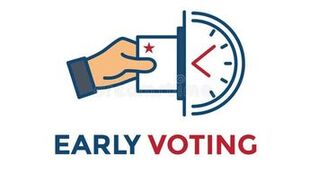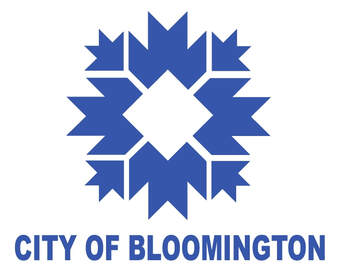 One area of importance for my job is simply listening. An issue that has come up is the safety of the Johnson Creamery smokestack. It is currently a hazard that has the B-line fenced off in that area. Engineers insist that the current height of 140 feet will need to be reduced to 60 feet. My first thought is that a visually dated non-functioning structure serves little use besides being a landmark of our heritage. A landmark that will include continued maintenance. My sense of practicality failed to see the purpose. However, having talked with a string of community stakeholders, I underestimated the importance of the smokestack to the skyline of Bloomington. My appreciation and understanding have grown based on a compelling case. It is essential to recognize landmarks that are significant to community members. This complex once housed employees in nearby neighborhoods. To many, the larger value is that the Creamery represents an iconic complex representative of a distinct coal-fired industrial architecture. My interest in this stems from having worked at the Creamery Building, the once long-term home of the Greater Bloomington Chamber of Commerce. The aesthetics of the building remain a drab red brick found in many desolate small-town centers. The interior of this facility is dated, musty, with little warmth or character beyond the mural dedicated to the creamery era. The opportunity cost of requiring any more funds than necessary on this property to me seemed ill-advised. Well, maybe I was wrong. The Power of listening in full effect.
0 Comments
 Early voting for the primary election begins next Tuesday, April 5th! If you have not registered to vote, there is still time to do so with voter registration ending on April 4th. Follow this link to register to vote, check your voter status, or update your registration information on the Indiana Voter Portal website. Hard copies can be found here with instructions on where to return applications. Remember to have your Indiana driver's license or state ID handy, so that all of the same information matches when you go to vote. Below are the following dates and times for early voting at Monroe County's Elections Operations site, 302 S Walnut St, Bloomington, IN 47401. On May 3rd, the official primary election day, voters are able to go to their assigned polling sites from 6:00 am - 6:00 pm, these sites can be found on the same website used above.
If you need any other additional information on primary elections, go to the Monroe County Government Election Central website here.  Mayor John Hamilton issued his “New Revenue Package” memo that outlines two revenue streams to meet the administration’s current spending priorities. 1) increase to the Monroe County Local Income Tax (LIT) rate and the issuance of two $5 million general obligations (G.O.) bonds for a five-year duration for capital improvements. Unfortunately, despite my best efforts I could not get the specified LIT increase. Based on the almost $17 million spending investments outlined in the memo it would most likely constitute a full 1 percent increase to 1.8450. Indiana State law has that the income tax encompass all of Monroe County. Ellettsville and the county council would weigh in as well but since the bulk of the population resides in Bloomington, it has the majority of the votes. The revenue returns would be somewhere around $17 million in new revenue annually. To get a larger picture of our local taxes click HERE. Below is the time frame:
The Mayor’s argument besides the needs is that the community has a capacity for the increase:
General Obligation Bond Projects:
To get further detail, Mayor Hamilton has put up a website with Frequently Asked Questions, Video Address, and a Feedback opportunity.  Taking over the highly visible advocacy wing of the Chamber, I am fully aware of the important accomplishments of my esteemed predecessors. The advocacy division will continue to be a presence at city and county meetings. Our elected officials will know we are paying attention, listening, and in the public sphere to promote business interests. The lack of local journalism oversight only heightens our role. It is also imperative to educate, gently nudge those elected officials on how the business environment runs beyond, zoning, signage, and parking issues. Quality of life issues plays a crucial role. Labor has more mobility than it has any lifetime. We will need to promote more housing, apartments, condominiums, single-family homes, and yes even student housing. The abundance of options will only have a positive effect on all those searching for places to live. On a similar level, we will provide those officials with cover on tough and unpopular decisions. Let those in power know they are doing an excellent job. The Chamber’s role to do right by the community. We saw this in full on the homeless in the seminary square controversy. It was not a popular position to take but it was a necessary one. Next, one matter is clear, we speak for business but oftentimes businesses cannot speak in one voice. The greater good may not be self-evident. On these occasions, we must be content to stay on the sidelines. Conversely, the Chamber must use its limited capital even on the less-heralded issues. This includes transparency, sound, efficient government. An example of this is the recent Novak report from the Mayor’s Office that attempts to streamline the forty-nine city boards and commissions. At the State level, we have been using that limited capital wisely. We cannot combat every misguided bill that enters those storied halls. What we can do is galvanize against legislation that puts our community at an economic disadvantage such as HB1002. Finally, I want to encourage dialog with members on issues important to them.  As things are quickly wrapping up in the statehouse, only a few bills remain for final revisions before making their way to Governor Holcomb. Throughout this short legislative session, the Chamber has been watching several bills that have the potential to affect its business members with special attention on: HB 1001: In the wake of the Omicron variant, legislators at the beginning of the short session considered the effectiveness of vaccine mandates and the role of private employers. This bill received a great deal of attention from those outside the statehouse for its loose exemption guidelines that were approved by the House mid-January. Recognizing the implications of this, the Senate amended this provision to mimic federal regulations regarding religious or medical exemptions in mid-February. Under this new law, private employers are not allowed to enforce a vaccine mandate without providing opportunities for employees to apply for exemption. Firing employees who apply for exemption could result in businesses paying for unemployment. New versions of the bill also take away the burden of COVID testing costs from the employer and places it on the employee or state to cover. HB 1002: In its original form, HB 1002 confronted various tax matters with a major point of discussion being the removal of the 30% floor for Indiana’s Business Personal Property Tax. House Representatives approved this bill at the end of January before sending it over to the Senate where it was gutted by worried officials in early March. Now, House and Senate legislators need to work together to resolve any issues posed by opposing chambers. Important add-ons to this bill are amendments that prevent the Indiana Lottery from using online platforms and set sunset provisions for the Food & Beverage Tax (with an explicit exception for Monroe County and other areas). SB 361: In an attempt to revitalize the state’s economy, SB 361 gives increased authority to the Indiana Economic Development Corporation (IEDC) to establish Innovation Development Districts (IDD) and distribute $300M in tax credits with an additional $300M appropriated for a special fund to be used for innovation. Upon receiving this bill from the Senate, House Representatives made changes to how money raised from taxes in these districts is reinvested back to local communities as opposed to a state-wide fund. Included in this bill is another provision that is the least talked about, but perhaps the most exciting. As a way to attract film production in the Hoosier state, tax incentives will be offered to companies in the film industry for shooting in Indiana. To follow any last-minute changes, head over to the Indiana General Assemby's website here. |
Categories
Categories
All
Archives
Archives
May 2024
|
|
Copyright The Greater Bloomington Chamber of Commerce. All Rights Reserved.

 RSS Feed
RSS Feed
